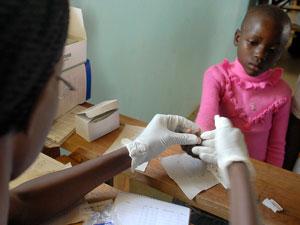Faith-based health care in Kenya
(Image by US Army Africa (cc:by))
This story was originally covered by PRI’s America Abroad. For more, listen to the audio above.
Story by Jordana Gustafson, “America Abroad”
The first step toward getting an eye exam at some clinics in Kenya involves hearing about salvation. The Evangelical Springs of Life Lutheran Church holds clinics in Nairobi’s sprawling Kibera slum, serving some 2,000 people each week. Dennis Meeker, the senior pastor at the church, told PRI’s America Abroad, “The most important thing is that when they’re here, they’re hearing the salvation story, and they’re hearing about Jesus.”
“I think it’s a wonderful care for the community,” Meeker said, “but I think it’s also the best evangelism outreach that could be. Because you’re loving your neighbor.” Meeker is not alone. It’s difficult to quantify how many faith-based organizations are operating in Kenya. The Capacity Project estimates that faith-based organizations provide 30-70 percent of the health care in many countries throughout Africa.
The convergence of health care and religion has some people nervous. “I feel that health care should come with no strings attached,” Dr. Michele Barry, Senior Associate Dean for Global Health at Stanford University’s School of Medicine, told America Abroad. Acknowledging the good work that faith based organizations do, Barry expressed concern about their work:
I think that what happens is that there’s a nuance of coercion, that if you don’t read this material, and you don’t think about my religion, you won’t get health care. And to me that’s unfair. And gives me pause.
For many other people, however, faith-based organizations are the only health care providers available. “People only go to the facilities which are accessible to them,” James Kiyiapi, Kenya’s Permanent Secretary of Medical Services, told America Abroad. “And for us therefore the role and the place of the faith-based facilities is extremely central to the overall health delivery of the country.”
The faith-based organizations have the benefit of being in places where no other organizations are. They’ve also been around longer than other non-religious organizations. “We could be in a country 10 to15 years, these church organizations have been here for 30, 40, 50 years and tend to be there for the next 30 40 or 50 years,” according to Kellie Leeson, Country Director for the International Rescue Committee. “So in terms of scope, in terms of sustainability, that’s really where it’s at.”
Organizations like the International Rescue Committee and UNICEF have been partnering with faith-based organizations to provide health care for more people.
“The main concern is people’s health. If faith-based organizations come up with that, I don’t feel bothered by that at all. I think it’s the right thing,” Siyama Ismai, who sought help in the Lutheran services in Kibera. Ismai, a Muslim, even prayed with the Christian pastor. “He gave me an opportunity to pray in my own way. And he also prayed,” she explained. “So we were praying to one god. So if any healing was to take place at that moment, it would be through the same same god that we were praying to, only in a different way.”
Hosted by veteran public radio journalists Ray Suarez and Deborah Amos, “America Abroad” documentaries explore the critical international issues of our time. “America Abroad” can be heard on PRI Affiliate stations across the US, and as a podcast.
